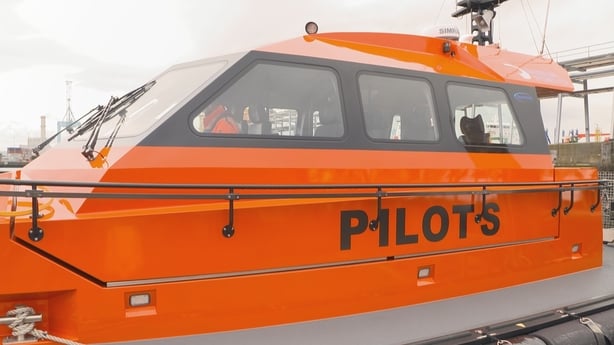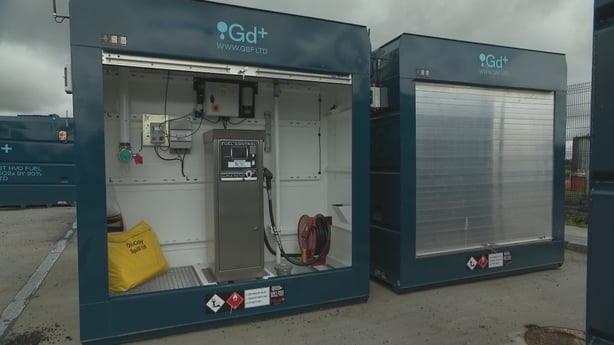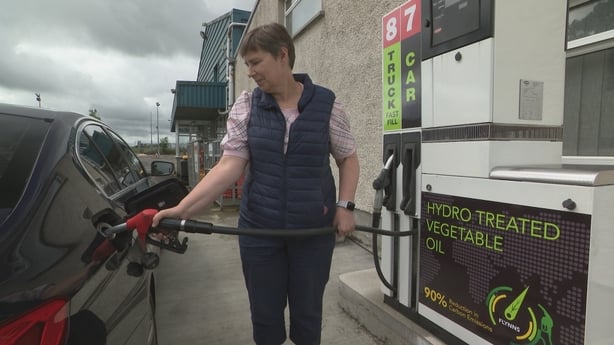Distributors are calling on the Government to reduce taxation on Hydrotreated Vegetable Oil, a low-emissions alternative to diesel fuel.
HVO can be used in nearly all diesel engines as well as for heating but currently costs about 15 cents more per litre than diesel.
Initial results from a trial on Pilot Boats at Dublin Port have shown it can reduce greenhouse gas emissions by 80 to 90% without any loss of engine efficiency or performance.
Like all public sector bodies, the Dublin Port Company is facing the monumental challenge of having to deliver a 50% reduction in its greenhouse gas emissions by 2030.
There are 17,000 maritime arrivals and departures at Dublin port each year and thousands of pilot and tugboat services must be operated to ensure they all come and go safely.
These are essential services operated by Dublin Port, but the boats are run on fossil fuel diesel.
The Pilot boat service alone is responsible for 20% of the Dublin Port Company's carbon emissions each year.
But since April Dublin Port has been running one of its most modern Pilot Boats, the DPC Dodder, exclusively on 100% Hydrotreated Vegetable Oil instead of diesel for a trial.
It has been very impressed by the 80 to 90% reduction in greenhouse gas emissions recorded and the seamless handling and performance of its Pilot Boat engines. It also found exhaust fumes had reduced significantly.

It is now testing the fuel on its two older pilot boats.
If, as expected, the results are just as good it says it is going to be able to slash the company's overall greenhouse gas emissions by up to 15% in one fell swoop.
It is not going to require it to make any big investment in new technology or machinery, or any new engines or boats.
The success of Dublin Port’s HVO trial so far suggests all they need to do is to switch from diesel to the alternative low carbon fuel.
Dublin Port Company CEO Barry O’Connell described it as a potentially transformative step for the Port as it works towards its 2030 Climate Action Plan targets.
HVO is made from plant waste, used cooking oil, animal fats and other renewable materials. It is refined in various locations around Europe and distributed in Ireland by two big companies, Certa and the Tria Group.
It can be used on its own in all diesel engines, including cars and generators. It can also be mixed in with existing diesel in a tank and the experts say the engines will work just as well.
The Harbour Master of Dublin Port Michael McKenna said it takes about 250,000 litres of diesel to operate the port's marine services each year and that other diesel engine users could follow suit and change over to HVO.
"The diesel engines in our boats are no different to the diesel engines fitted in other machinery around the world, whether it be farm machinery, road machinery or anything else. There has been no operational impact on our boats, no maintenance impact, and the key high level of reliability of the craft is still there".
The early results of the HVO trial at Dublin Port is music to the ears of Thomas Flynn, who has been supplying HVO fuel for trucks and cars from his premises at the Downs in Mullingar for the past two years.
He says it is a completely renewable fuel that can replace diesel in cars, trucks, tractors, combine harvesters and other diesel engines, delivering a 90% reduction in carbon emissions for all.
The HVO he supplies comes from a company called Green Biofuels in the UK who get it from Nesta, a refinery, in Finland.

"Anything that burns diesel will burn this. It is the next big thing. Every filling Station will have HVO on sale over the next few years," he said.
"A lot of companies are only beginning to find out about it now. We are talking to them and telling them about the benefits. A lot of progressive companies are moving over to it now and replacing diesel".
There is a fuel pump in Flynn’s garage in Mullingar that looks and operates exactly like any other fuel pump on a forecourt except that what comes out of the nozzle is HVO rather than diesel.
Mr Flynn showed it to me in a bottle. It is a clear, odourless, silky, see-through liquid with a slightly greenish tinge.
"If you want to use it in your car all you need to do is to pull up at the pump and fill up. You don’t have to empty your tank or change anything, no engine modifications, you just drive away. You don’t have to go electric. It is an option for people with a diesel engine so they can see out the life of their vehicle," he said.
According to Mr Flynn, HVO is also a great fuel for reducing greenhouse gas emissions from oil-fired central heating systems at very little cost. All it requires he said, is a slight modification involving some pressure adjustments to an existing boiler, a change in a nozzle, and for the boiler to be serviced.

"A lot of companies are now using HVO in their trucks and the response has been very good. There are no reports of any vehicles suffering a loss of power or performance or using more fuel. It is all working out just fine. There are no issues, he said.
Flynn’s has onsite storage capacity for one million litres of HVO while Tria, the company Mr Flynn works with, now has a new facility in Cork which can store five million litres of it.
The main issue and concern users have about HVO is the cost. It is about 12 to 15 cents more expensive per litre to buy. It has the same excise duty as fossil diesel, but truckers who use it are not entitled to the excise duty rebate they get from the exchequer for using ordinary diesel.
"That’s the thing most people find difficult to comprehend. The Government needs to intervene and bring the price down to the same level as fossil diesel at least, so the customers could change over and do the right thing without it costing them too much money.
"You don’t have to wait for hydrogen and all of these other fuels that are years away. We can go with this. It is a clean solution here and now. If you take Dublin Bus or any of those companies that might use this product, it’s a no brainer," said Mr Flynn.







